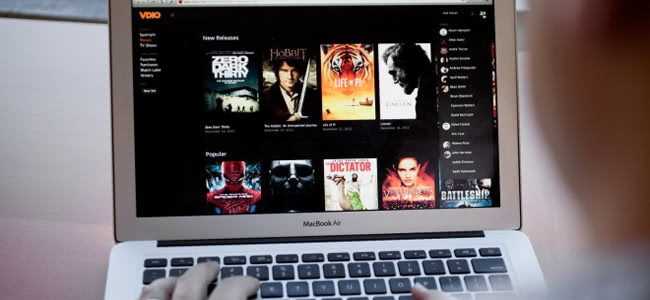As previously reported, innovations in the online streaming service market have been brewing significantly over the past week, with Deezer planning for a conceptual overhaul in music consumption, and Spotify looking to move in on Netflix’s online movie territory – but it seems Rdio, who only recently appointed former General Pants and Viacom marketer Colin Blake as their Australian executive, has beaten both of them to the punch.
As Billboard reports, Rdio have launched a twin online movie streaming service called Vdio – much to the surprise and aggrivation of many competitors presumably .
For current Rdio subscribers, Vdio has been made available in the form of two accounts which have been linked, with social connections already imported. The conditions for this new service involves a bang-for-your-buck deal for Rdio subscribers on a $10-a-month unlimited plan, who are given a promotional $25 to use in Vdio. The same deal being extended to those who subscribe to Rdio within the next 60 days.
Capitalising on a growing market and demand, the strategy behind the bold move into a secondary medium is one fuelled by changing perceptions in music-and-film consumption, and according to Rdio, both forms are ceasing to be mutually exclusive.
“There’s just so much interplay between film, TV and music. We just think this is going to be a natural combination,” said Rdio Chief Executive Drew Larner.
With a firm foothold in the movie industry, having held executive roles at Spyglass Entertainment and Twentieth Century Fox as reported by TechCrunch, Larner’s views come as no surprise. “There’s just so much interplay between film, TV and music. We just think this is going to be a natural combination” – Drew Larner, Rdio Chief Executive
Despite Rdio/Vdio’s huge leap into uncharted territory however, there is still a way to go; the new online movie service ultimately prescribing to a more unorthodox transactional model used by sites such as Amazon On Demand rather than the “all-you-can-eat” subscription model that Rdio employs for its music service, and boasted by the likes of Spotify and Deezer.
This has been a deliberate, albeit controversial, strategy in order to gain access to more recent and current movies and TV, according to Larner: “In order to get Argo for example or Modern Family those aren’t available in this window as part of a subscription service…But that’s what we wanted to start with.”
Billboard notes alongside Larner’s observation, that the studios’ “windowing strategies” of TV and movie releases normally keep subscritption services out of date, putting DVD and on-demand releases ahead of the pack.
It seems such a line of thinking may pay off, with Rdio’s deliberations and behind-the-scenes tinkerings on Vdio having accumulated in a wealth of content deals. Larner declaring in an interview with TechCrunch, that: “We are ingesting content from all the major players, with just a couple of missing pieces. It’s at 90 percent.”
No doubt Larner’s movie house connections have been helpful, with deals reportedly being brokered by Rdio with Fox, Warner Brothers, Paramount, MGM, Sony, CBS, ABC and Disney. Lionsgate UK being one major company missing in the mix. “In order to get Argo for example or Modern Family those aren’t available in this window as part of a subscription service…But that’s what we wanted to start with.” – Drew Larner, Rdio Chief Executive
However a subscription service for Vdio could be a possibility in the future. Larner alluding to that form of transaction as and “obvious progression”, which Vdio will make in time.
Spotify are also looking at an expansion into the video streaming market, following Rdio’s lead, to compete directly with the likes of YouTube and America’s NetFlix service with a video and movie content arm to its current music streaming model.
The Swedish-based music service are also reportedly in talks with the ‘Big Three’ – Sony, Warner, and Universal – about renegotiating lower licensing costs, as part of an expansion that will extend its online 30-day ad-backed free trial model to mobile, which currently only supports its premium subscription service.
Why the sudden move into video streaming services for all the big music players? Well, aside from the fact that on-demand digital streaming is booming in popularity at the moment, it’s not exactly big business financially.
With insider industry reports noting that despite the popular perception of Spotify as a major market leader, with 6 million paying subscribers and a $100 million investment from the likes of Coca-Cola and Goldman Sachs last year, it still runs at a loss – mainly to bleeding money in marketing and licensing.
An expansion into video would help anchor some of those heavy costs, as well as open up the likes of Rdio and Spotify to new – hopefully paying – markets. Still, there’s no faulting the growing cultural impact and importance of music streaming services, shown both by the numer of big companies looking to enter the market – including Amazon, Apple, Google, Twitter, and Beats Electronics’ Trent Reznor-helmed ‘Daisy’, and the most recent industry reports.
The IFPI’s Digital Music Report showed subscription services experienced a 44% rise, with 20 million paying subscribers worldwide expecting to help account for 10% of digital music revenues, while the RIAA’s own recent report demonstrates the same services – which it labels ‘access models’ – accounted for over $1 billion in music sales in 2012 and a 15% share.
Also in America, a recent survey from the NPD Group shows that streaming services are as popular as radio now among those aged under 35, with 23% of those surveyed using services like Spotify, iHeartRadio, and especially Pandora (with a nearly 40% share), almost as much as traditional radio at 24%.

































